Bone Broth Vitamins: Why are They so Low?
Vitamins in Bone Broth
You're looking for a good way to improve your health, and you've heard about bone broth.
It is supposedly full of vitamins, minerals and everything that's good for your body. But wait – what if I told you that the vitamin levels in bone broth are ridiculously low?
Wouldn't it be great if there was an easy way to get all of the benefits of bone broth without having to worry about pesky vitamins?
That's where this guide comes in. I'm going to tell you exactly how many nutrients, minerals and vitamin are in each cup.
I'll spill the beans on why the number is so low. This one will shock you as I haven't seen anyone else figure it out.
Quick recommendation before we begin, if you are looking for a product recommendation for a bone broth that is actually worth your money, try Bluebird Provisions.
Their bone broth powder has more protein and amino acids to heal you gut that any other one out there.

What are vitamins?
Vitamins are tiny nutrients that help regulate molecular machinery in the body. They work to keep our cells healthy and our body moving.
We get them from the food we eat. So called superfoods may have more vitamins and regular foods. The funny thing is that most people thing bone broth is full of vitamins, but they are wrong. At least in the traditional sense.
I'll explain more throughout this article.

Vitamin Benefits
Vitamin benefits include improving metabolism, energy production and immune system function. They build our cells and help us fight infection. They are vital to our overall health and well being.
Some of them improve our vision while others work together to prevent disease and illness. Finally, some work on muscle growth and recovery.
You can't do anything without them, so it behooves you to eat foods which are rich in them. This brings me to this point.
Vitamins in Bone Broth
The vitamins found in bone broth include potassium, magnesium, calcium, chloride, phosphorus and sodium. Of course this is in addition to the skin and joint building proteins like collagen and gelatin.
Bone broth is also full of gut healing amino acids like glycine, glutamine, proline and arginine.
Finally, there are unique compounds called proteoglycans which hydrate your skin and joints to build new connective tissue. These include glucosamine, chondroitin and hyaluronic acid.

All of these nutrients work together to improve immune function and promote proper digestion.
The crazy thing is that bone broth is often praised for being vitamin rich, when it is not. Let's go through each and see what the truth is.
Specific Levels of Each Vitamin in Bone Broth
Specific levels of each vitamin in bone broth are as follows:
Calcium: 10-40 mg
Potassium: 50-400 mg
Magnesium: 12-17mg
Sodium: 160-720 mg
Iron: 0-0.5 mg
Zinc: 0-0.15 mg
The sources for these values come from the following paper: Essential and toxic metals in animal bone broths by Hsu, Lee, Tsai and Chien in 2017 (1).
I also supplemented that information with nutrition lab results from my own company for our Organic Beef and Organic Chicken Bone Broths.
I have done testing with and without the use of apple cider vinegar to compare the results. You can see them in the image below. 
How do the vitamins in bone broth compare to other sources?
The amount of vitamins and minerals in bone broth is surprisingly low. Of course you will get more calcium in milk, vitamin C in an orange and zinc from eating beef liver.
But bone broth is not about the vitamins and minerals. It is about the amino acids, proteins and proteoglycans. The benefits of these far outweigh the micronutrients in any other food.
What are the benefits of vitamins in bone broth?
The benefits of the vitamins in bone broth have nothing to do with the actual vitamins but more to do with unique proteins and amino acids.
- Glucosamine and chondroitin are proteoglycans that are commonly used to support those suffering from joint pain or cartilage breakdown.
- Collagen supports healthy skin and is even shown to reduce wrinkles and crow's feet over time (2).
- Gelatin helps stimulate digestive enzymes in the gut to restore proper digestion. It also helps to heal and rebuild the mucous layer of your gut. Which is a good thing, trust me.
- Glycine is an amino acid used to heal the guts of those suffering from IBS, IBD, Crohn's Disease and Ulcerative Colitis.
- Glutamine helps to heal leaky guts, reduce bloating, cramping and constipation.
- Potassium helps maintain fluid balance, hydration and muscle contractions throughout your body.
- Hyaluronic Acid helps hydrate the dermis layer of your skin while helping bring synovial fluid to heal stiff joints.
These are merely scratching the surface on the powerful capabilities, read my full review of the health benefits of bone broth for more.
Why are vitamins in bone broth low?
The vitamins in bone broth are low because it is a complex cooking process. While it seems straightforward, with just boiling bones in water, on a molecular level, there is a lot going on.
Unfortunately, we do not know exactly why the vitamins are low, but I'll offer you two reasons based on my logic and talking to scientists and lab technicians.
You need to understand that just because we are physically breaking down the bones using heat and water, it doesn't mean the minerals from these bones end up suspended in liquid.
The first reason is that the vitamins react with the proteins which removes or dissolves them from the broth.
The second is that the vitamins are never fully released from the bones and cartilage you are simmering in water. So what is actually happening then?
Good question. The bones are breaking down into tiny fragments or sediment. If you've made it at home, you know there is a sludge or sediment that forms at the bottom of your pot.
They never get small enough to suspend into the broth itself. The sludge is where the actual vitamins and minerals are.
How To Maximize Bone Broth's Nutritional Value
You can maximize bone broth's nutritional value by drinking it before you exercise, with some vitamin C and a tiny bit of acid. Let me explain the rational below.
Vitamin C (50 mg) helps to shuttle the collagen and amino acids from the broth into your skin, joints and tendons. The tricky part is that is needs some help to do this. Exercise or movement.
Exercise or movement loads your joints and tendons which helps move the amino acids into them. From a practical perspective, simply drink it before you exercise, go for a walk or do anything active (3).
The addition of a bit of acid is thought to help increase digestion.
The big assumption with these tips is that you have a quality product in the first place. You must look for one that has at least 8 g protein per 240 ml serving and less than 220 mg sodium. These are the bare minimum. Anything with less protein is not a real bone broth.

How much bone broth should I consume to get the benefits?
The amount of bone broth you should drink each day can vary depending on your nutritional needs and health goals.
I always tell people starting out to try 1 cup per day for 3-5 days. Then see how you feel. Is your digestion better and energy more stable? Do you feel great?
From here you can increase your intake over time. Many people I speak with drink 3 cups per day. This is likely not needed unless you really enjoy it, or are trying to heal a gut issue.
Skin health benefits often take 6 to 8 weeks to see the effects. This is longer than some of the gut health and digestive positives, where you might see them in as little at one week.
I'll mention that fasting with bone broth is popular right now. It is not advisable for pregnant women, breastfeeding mothers or young people. Please do your research, read the article and talk to your doctor.
Are there any interactions between vitamins in bone broth and other supplements or medications?
There are no known interactions between bone broth and other supplements or medications. That being said, it is important to consult a doctor before taking any supplements or medications. I am a broth expert, not a supplement expert.
What is the best way to store bone broth to preserve its vitamins?
Store it in the fridge to preserve its nutrition. There are no other fancy tips or tricks. Just follow the guidelines on your package and you should be good to go.
Closing Thoughts
So, there you have it. The vitamins in bone broth are low, but it's not a cause for concern. The broth is still healthy and nutritious, and it's a great way to promote gut health, digestion, skin health, sleep and reduce joint pain.
Bluebird Provisions makes the best bone broth on the market. It taste delicious and uses 100% recyclable packaging, so you can drink it knowing you are not harming the environment. Find them on Amazon Prime for free shipping.
Sources:
(1) https://www.ncbi.nlm.nih.gov/pmc/articles/PMC5533136/
(2) https://www.ncbi.nlm.nih.gov/pmc/articles/PMC8824545/
(3) https://pubmed.ncbi.nlm.nih.gov/27852613/

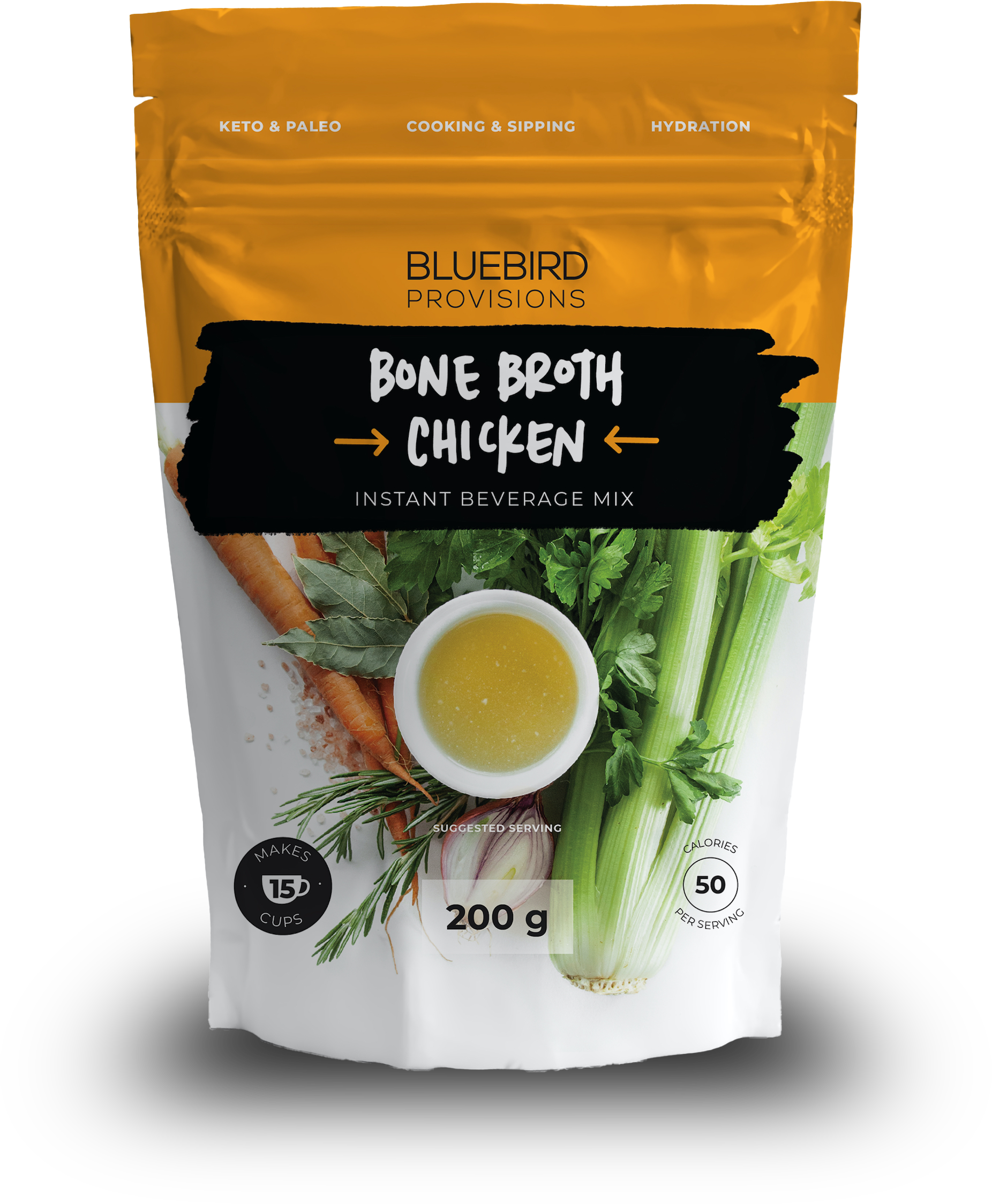





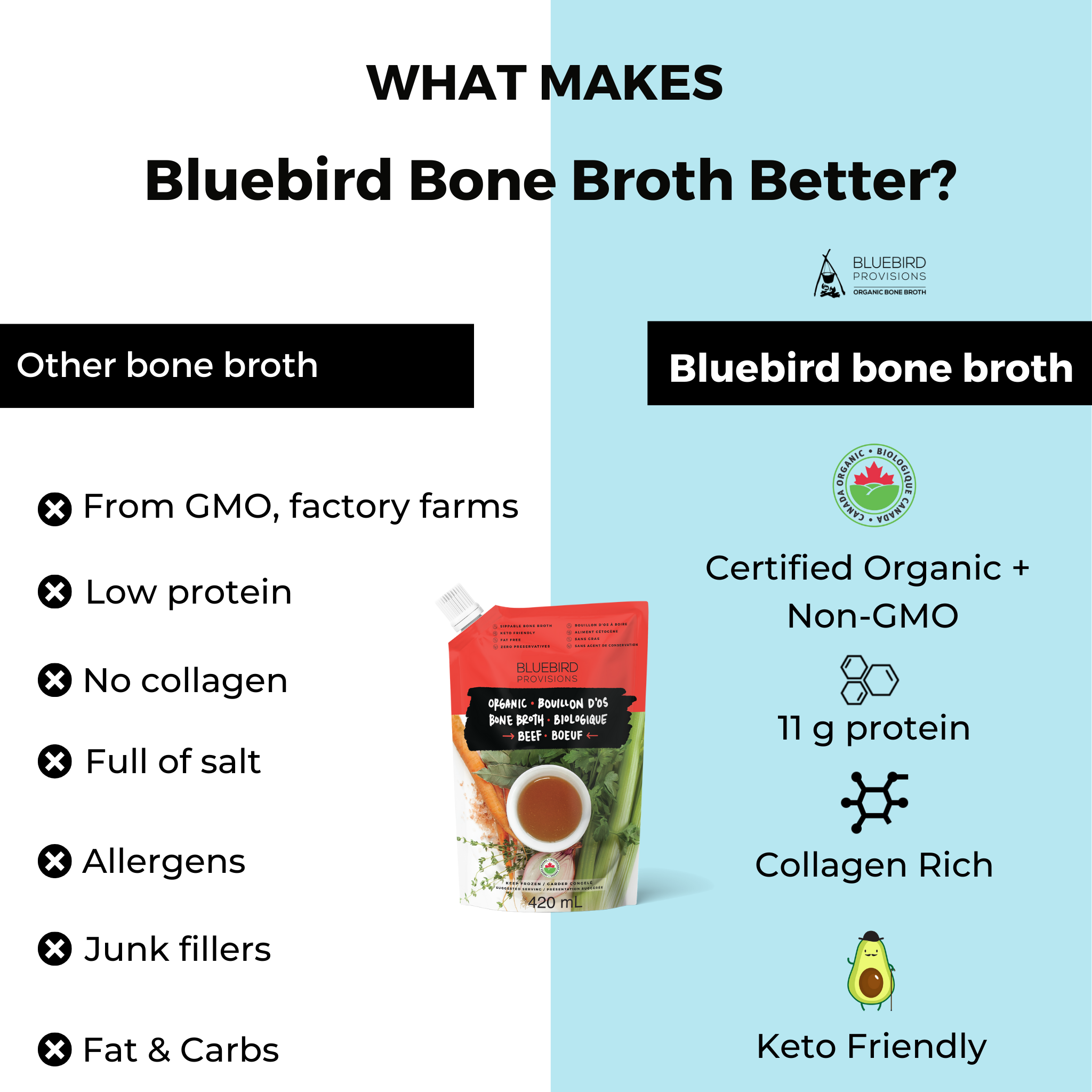
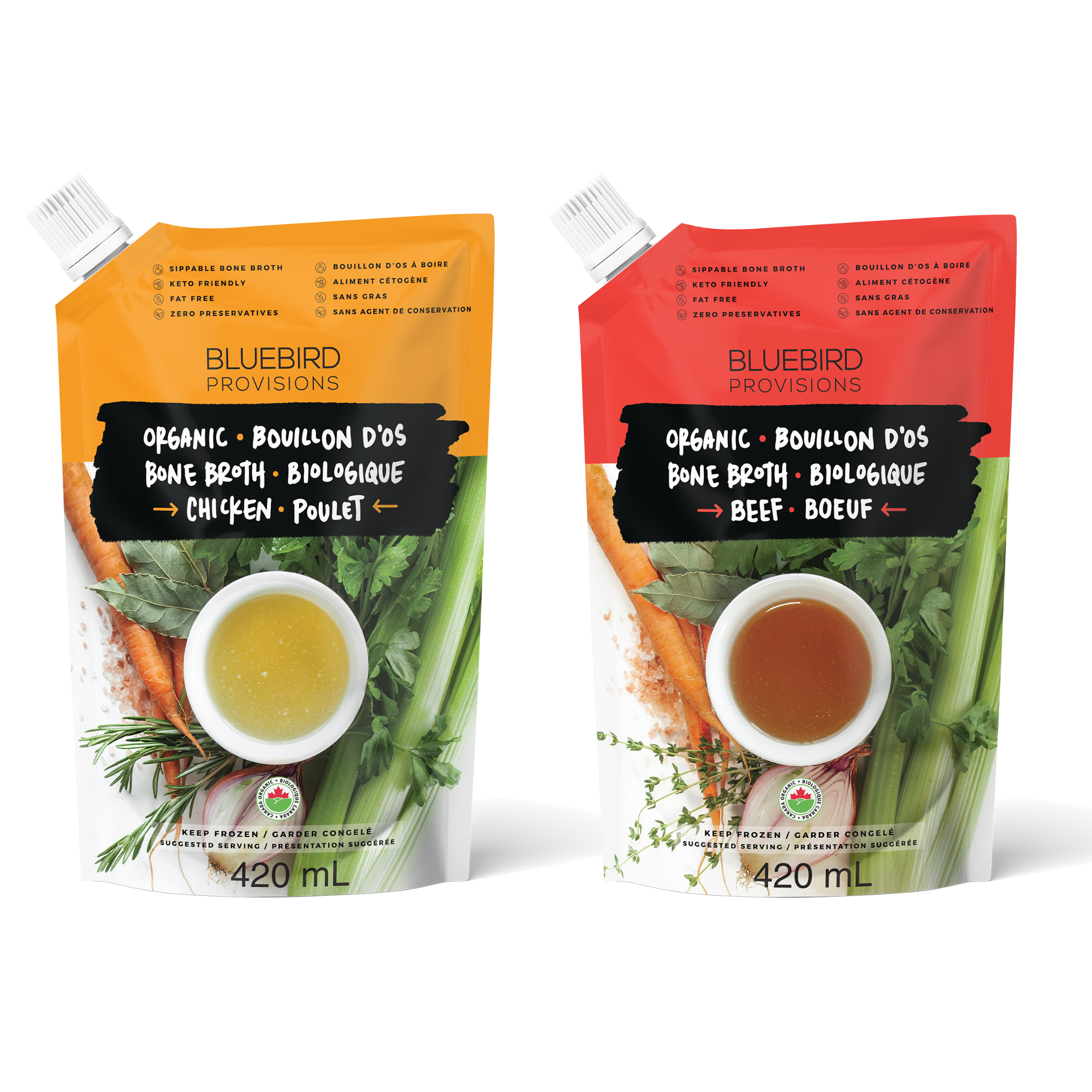

2 comments
Hi SharlEen,
Darn that is a question a bit out of my area of expertise. I would check with a doctor or registered dietician to be on the safe side.
Connor at Bluebird Provisions
Can I continue to take bone broth if I take glutalytic to help with gluten intolerance.
SharlEen Butler
Leave a comment
This site is protected by hCaptcha and the hCaptcha Privacy Policy and Terms of Service apply.